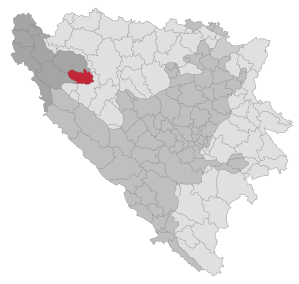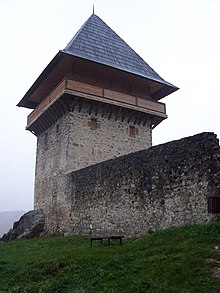Ključ
|
Ključ Кључ |
||
|
|
||
| Basic data | ||
|---|---|---|
| State : | Bosnia and Herzegovina | |
| Entity : | Federation of BiH | |
| Canton : | Una-sana | |
| Coordinates : | 44 ° 35 ' N , 16 ° 42' E | |
| Height : | 266 m. i. J. | |
| Area : | 358 km² | |
| Residents : | 18,714 | |
| Population density : | 52 inhabitants per km² | |
| Telephone code : | +387 (0) 37 | |
| Postal code : | 79280 | |
| Structure and administration (as of 2016) | ||
| Mayor : | Nedžad Zukanović ( SDP ) | |
| Website : | ||
Ključ ( Serbian - Cyrillic Кључ ) is a place and the associated large municipality ( Općina ) in the northwest of Bosnia and Herzegovina . It is located in the Sana Valley and belongs to the Una-Sana canton of the Federation of Bosnia and Herzegovina .
history
Middle Ages and Ottoman Empire
The fortress from which the place takes its name (Ključ means " key ", "key to Bosnia") was probably built in the first half of the 14th century. The last Bosnian king Stjepan Tomašević was captured by the Turkish army here in 1463 . The settlement was continuously expanded as it was of great military importance. Until 1838 a complete Turkish garrison was stationed here, which controlled the traffic connections through the Sana Valley.
Bosnian War and Postwar Period
At the beginning of the war in Bosnia in 1992, the Serbs formed the relative majority of the population in the larger municipality and the absolute majority in the main town of Ključ.
The Serbian majority party SDS won the first democratic elections in the larger community in 1991. In the course of Yugoslavia's disintegration process, the Serbian administration of the larger municipality joined the other Serbian administered larger municipalities of the breakaway Yugoslav republic of Bosnia and Herzegovina to form the so-called "Serbian Autonomous Areas" (Srpske Autonomne Oblasti). These areas later formed the Republika Srpska.
During the Serbian administration of the large municipality in Ključ from 1992 to 1994, the non-Serbian residents were expelled and partially murdered by the Army of the Republika Srpska (VRS) and the Serbian-controlled Yugoslav People's Army . It is said to be around 700 dead in the larger community, while numerous other prisoners were abducted to the Manjača camp and murdered there.
During the Serbian control of the city, all five mosques and the city's only Catholic church were blown up and some of the houses of the Croatian and Bosniak residents were looted and set on fire.
On September 16, 1995, the city and most of the surrounding villages were captured in the course of the Bosniak military offensive, Operation Sana , led by Atif Dudaković . As a result, almost all Serbian residents were expelled from Ključ or fled. There was no return of the displaced and fled Serbian residents of Ključ after the war.
In the large municipality of Ključ there were several mass graves in which Bosniak and Croatian victims of the massacre were buried. The largest sites were:
- Lanište I (188 body finds)
- Lanište II (77 body finds)
- Prhovo (38 body finds)
With the Dayton Treaty , the entire city of Ključ and the northwestern part of the former općina of the Federation of Bosnia and Herzegovina was added; today it is almost completely inhabited by Bosniaks (approx. 97%). The larger south-eastern part of the former large municipality with about 6500 inhabitants (almost exclusively Bosnian Serbs, status: 2013) has belonged to the Republika Srpska since then and forms an independent municipality called Ribnik.
Administration and Transport
Large community administration
In addition to the city center, Općina Ključ consists of a total of 10 other municipalities:
- Biljani
- Donja Sanica
- Humići
- Kamičak
- Ključ (city)
- Krasulje
- Sanica
- Velagići
- Velečevo-Dubočani
- Zgon-Crljeni
traffic
With the M5 and M15 , two important roads run through Ključ. The city is located on the one hand with the M5 directly on the connection from the Bosnian-Croatian border Ličko ( Rakovica ) - Izačić ( Bihać ) to Sarajevo and on the other hand is connected with the M15 from Bosanska Dubica to Livno on the Adriatic coast.
In the future, a four-lane B1 expressway will also run through Ključ .
population
Before the war, the large municipality had around 45,000 inhabitants, while at the 2013 census only 18,714 residents had their main residence in Ključ. In 1991 the population in Ključ consisted of about half each of Bosniaks (Bosnian Muslims) and Bosnian Serbs . Smaller minorities were formed, for example, by Croats , Czechs , Slovaks and Roma, mainly in the city and in a few places in the area.
Today, due to the reconquest of the city on September 16, 1995 by the 5th Army Corps of the Republic of Bosnia-Herzegovina and the associated expulsion of the Serbian residents, the Bosniaks form an absolute majority (over 97%).
religion
As almost everywhere in Bosnia and Herzegovina, people of different religions lived in Ključ . Today the absolute majority of the population is Muslim. Accordingly, there are several mosques throughout the Općina. In the city center there is not only a mosque, but also a Serbian Orthodox and a Roman Catholic church.
Personalities
sons and daughters of the town
- Serif Konjević (* 1958), singer
- Jovan Perišić (* 1972), singer
- Muhamed Subašić (* 1988), football player
- Josip Kleczek (1923–2014), Czech astrophysicist, born in Gornja Sanica
Personalities who have worked on site
- Zlatan Muslimović (* 1981), soccer player, was born in Banja Luka , but his family originated and lived in Ključ until the outbreak of war.
Individual evidence
- ↑ Discover Bosnia-Herzegovina
- ↑ Killing People's Souls. November 3, 2009, accessed February 27, 2018 .
- ↑ a b http://veterani.ba/naslovna/?p=6413
- ↑ http://www.icty.org/x/cases/krajisnik/tjug/en/kra-jud060927e.pdf
- ↑ Susanne Koelbl: Shot and buried . In: Der Spiegel . April 21, 1997 ( spiegel.de [accessed February 27, 2018]).
- ↑ Archived copy ( Memento of the original dated February 22, 2014 in the Internet Archive ) Info: The archive link was inserted automatically and has not yet been checked. Please check the original and archive link according to the instructions and then remove this notice.
- ↑ http://motorways-exitlists.com/europe/bih/bosnia_and_hercegovina.htm
- ↑ Archived copy ( Memento of the original from May 20, 2009 in the Internet Archive ) Info: The archive link was inserted automatically and has not yet been checked. Please check the original and archive link according to the instructions and then remove this notice.








